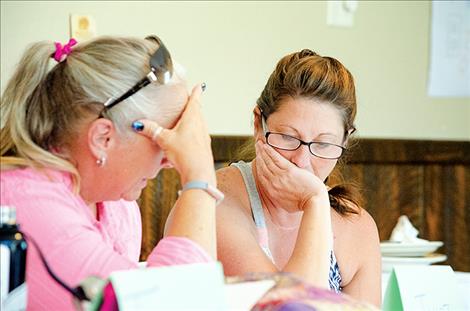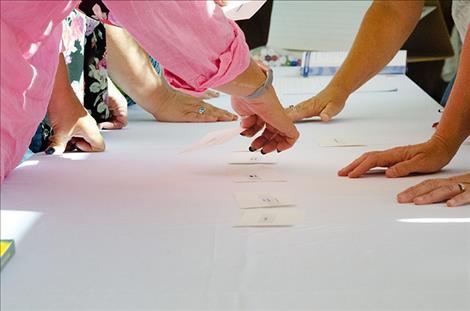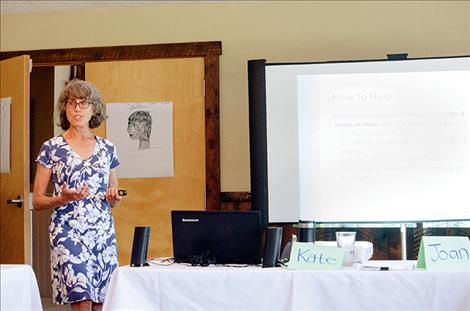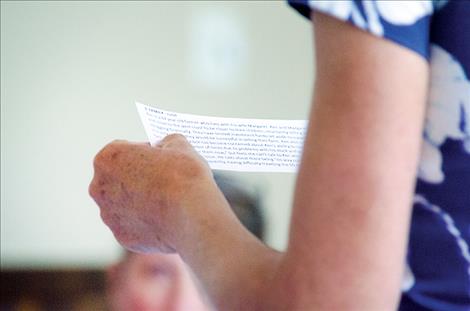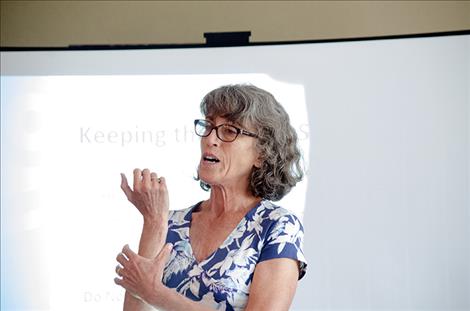Suicide prevention plan brought to community
Hey savvy news reader! Thanks for choosing local.
You are now reading
1 of 3 free articles.
CHARLO – What do you say to a person experiencing suicidal thoughts? The National Council for Behavioral Health directed a grant to Lake County to fund a Mental Health First Aid class to help people answer that question.
The class was led by Nate Chute’s Foundation Director Joan Schmidt, which is a nonprofit dedicated to suicide prevention in Western Montana.
Your Life Matters, a Lake County group working to bring attention to suicide prevention, organized the venue for the local class on Saturday, July 15, at the Ninepipes Lodge.
During the class Schmidt told participants there isn’t a script someone can follow to help a person experiencing a crisis but the overall message should be one of care and compassion.
“You are not expected to fix a situation,” she said. She added that the first aid program is meant to help people learn to react to mental health situations. People attending the class receive certification much like CPR training.
She said community members and family are often the first to notice a situation and sometimes they don’t know what to do. The action plan is a tool with five nonlinear steps to help a person in need with the acronym ALGEE, which basically means people need to evaluate the situation, listen without judgment, and encourage professional help.
Assessing a person for risk of suicide or harm is the first step in the action plan. “You won’t always know for sure that someone needs help,” she said. “Sometimes it’s just a gut feeling you have and you should follow that.”
She said people of any age, race or gender can experience depression or anxiety, and they might eat too much or not enough or sleep too much or not enough. They might lose passion for things and become withdrawn.
“Maybe they love playing basketball and they stop and they don’t replace that with something else they like to do,” she said.
Additional risk factors for suicide include but are not limited to: feeling hopeless, abuse, addiction, social isolation, childbirth, unrealistic expectations, impulsive or aggressive tendencies, fatigue, frequent self-criticism, experiencing loss, physical illness, fear of humiliation, a family history of suicide, and barriers to accessing mental health treatment.
Listening in a nonjudgmental way and asking questions is the second action plan. Schmidt said the best thing to do in this step is to acknowledge the person’s feelings and validate them.
Kate Berry, program coach, assisted with the training program. “It’s powerful to have these tools and stand by a person and say ‘you are not alone,’” she said.
Giving reassurance was the third step. Schmidt said this is the time to offer encouragement and information if available. People can also look for resources together. “This is the time to ask, ‘How can I help,’” Schmidt said.
And people also need to ask the tough question: “You need to ask them if they are thinking about committing suicide and if they have a plan,” Schmidt said.
This question can cause anxiety for both people in the conversation due in part to the stigma surrounding suicide. She said people can feel shame when they are dealing with mental health issues and they don’t want to share or they are afraid to answer. She also said talking about suicide with compassion won’t increase someone’s risk of doing it.
“It can be hard to get this question off your tongue but be direct and to the point,” Berry said. “You can give someone with depression a lot of power if you let them say ‘ya, that is what I am thinking about.’”
Encouraging appropriate professional help and encouraging self-help and other coping strategies are the final steps. This step includes looking for outside resources, which might be offering to drive that person to the emergency room and staying with them if they are in immediate danger. “There is no shame in getting help,” Schmidt said.
Resources can be difficult to find in rural areas so continuing to support that person is important, she added.
A person in crisis might need support to call for help. Schmidt recommends calling the numbers together including hospitals or mental health providers. People should call 911 in an immediate emergency. The Montana Suicide Prevention Lifeline is 1-800-273-TALK or text MT to 741-741.
Schmidt said she likes to tell a true story about a man who attempted suicide. He survived and was given treatment for his mental health condition. She said he told people that he had no idea recovery was possible. “Recovery is possible,” she said. “That is very important for people to remember.”
The National Council for Behavioral Health brought mental health training classes to Montana due to the state’s high suicide rates. The American Foundation for Suicide Prevention ranked Montana as third in the nation for the number of suicide deaths according to 2015 data from the Centers for Disease Control and Prevention. Suicide is the second leading cause of death in Montana for ages 10-44; the fourth cause of death for people ages 45-54; the fifth cause of death for people 55-64; and the 14th leading cause of death for people 65 and older.
Lake County was identified as having one of the higher rates of suicide in the state, according to Schmidt. She said it’s difficult to determine the exact rate of suicide in a county because suicide can be reported as a drug overdose or other cause. According to the Montana Department of Public Health and Human Services, 25 suicides occurred in Lake County from 2014 to 2016.
Schmidt said Mental Health First Aid programs have helped in other counties with high suicide rates and more classes will be available in the future. If anyone is interested in hosting a class, contact Schmidt at 406-871-1008 or jschmidt06@centurytel.net. Class locations can also be found at mentalhealthfirstaid.org.















